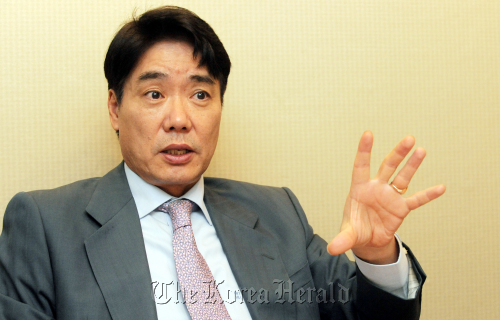[Herald Interview] FORCA to foster relocation of Japanese firms to Korea
By Korea HeraldPublished : March 27, 2012 - 20:16
For decades, business associations have been known for aggressive lobbying of policymakers while passively responding to calls for corporate social responsibility.
The Korea Foreign Company Association, the largest foreign business community in the country, is seeking to change this image and expand its role to attract overseas businesses.
Kim Jong-shik, the newly appointed chairman of FORCA, says the organization is drawing up a plan help transfer the headquarters of Japanese firms to Seoul this year.
“A lot of Japanese manufacturers that suffered disruptions from the earthquake last year are increasingly willing to move their production plants to Korea,” Kim told The Korea Herald.
The Korea Foreign Company Association, the largest foreign business community in the country, is seeking to change this image and expand its role to attract overseas businesses.
Kim Jong-shik, the newly appointed chairman of FORCA, says the organization is drawing up a plan help transfer the headquarters of Japanese firms to Seoul this year.
“A lot of Japanese manufacturers that suffered disruptions from the earthquake last year are increasingly willing to move their production plants to Korea,” Kim told The Korea Herald.

“We are organizing a series of investor releations events participated in by local governments in need of investments, major banks, accounting firms and the main bourse operator to make the transition as transparent as possible,” he added.
The project is addressing the needs of those who want to move to a country where there are fewer natural disasters, and labor skills are just as sophisticated. FORCA says those willing to relocate their headquarters to Seoul include some of Japan’s top 100 companies by market capitalization, without disclosing their names. It expects hundreds of Japanese companies to join their investor releations events in Tokyo and Osaka in September.
Kim, also the chief of Tata Daewoo Commercial Vehicle Co., noted the strategic importance of the project as the major relocation of production plants could create thousands of jobs and boost the local economy.
“Although I can’t disclose the names of the interested ones, some of them export not only to Korean companies but also to many other regions. Thus the relocation of plants would bring enormous benefits to the local economy,” Kim said. Impacted by the Japanese earthquake last March, those supplying their finished goods to Korean conglomerates experienced production shortages. The trend is to relocate their plants to Taiwan, Korea, China and even Brazil.
A total of 10,621 Japanese companies relocated their headquarters last year to either low-cost countries or the western side of the country where quakes are less frequent, according to Teikoku Databank, a market research firm. The number is up 5.8 percent from the year before, and the highest number in five years.
The biggest outflow was from the Fukushima Prefecture town of Futaba which has a number of nuclear power plants. Makers of components requiring a high degree of precision work, such as BT resin and batteries, last year failed to meet panel demand, impacting production of notebooks, tablets and other electronic products.
FORCA says the help it intends to provide to the interested Japanese firms will be comprehensive. By inviting the Korea Exchange, the country’s main bourse operator, major accounting firms and banks to the IR events, it aims to help the companies minimize the uncertainty. FORCA has already invited officials from the Ministry of Foreign Affairs and local municipalities to help answer all visa and policy-related questions that may arise.
“As the largest foreign business community in Korea, we will try our best to help them set up here,” Kim said.
By Cynthia J. Kim (cynthiak@heraldcorp.com)
-
Articles by Korea Herald






![[From the Scene] Monks, Buddhists hail return of remains of Buddhas](http://res.heraldm.com/phpwas/restmb_idxmake.php?idx=644&simg=/content/image/2024/04/19/20240419050617_0.jpg&u=20240419175937)




![[Graphic News] French bulldog most popular breed in US, Maltese most popular in Korea](http://res.heraldm.com/phpwas/restmb_idxmake.php?idx=644&simg=/content/image/2024/04/18/20240418050864_0.gif&u=)




![[From the Scene] Monks, Buddhists hail return of remains of Buddhas](http://res.heraldm.com/phpwas/restmb_idxmake.php?idx=652&simg=/content/image/2024/04/19/20240419050617_0.jpg&u=20240419175937)

![[KH Explains] Hyundai's full hybrid edge to pay off amid slow transition to pure EVs](http://res.heraldm.com/phpwas/restmb_idxmake.php?idx=652&simg=/content/image/2024/04/18/20240418050645_0.jpg&u=20240419100350)

![[Today’s K-pop] Illit drops debut single remix](http://res.heraldm.com/phpwas/restmb_idxmake.php?idx=642&simg=/content/image/2024/04/19/20240419050612_0.jpg&u=)